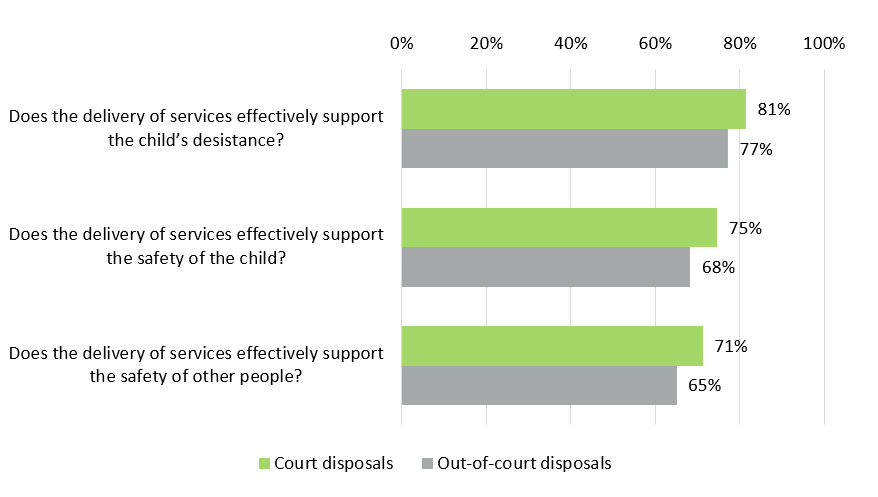Implementation and delivery

Key findings
- Each child should benefit from a high-quality, personalised and supportive service, with a continual focus on providing the right help at the right time in a proportionate and holistic manner. Attention should be given to overcoming any potential obstacles and establishing stability where necessary to enable the child to begin to move forward.
- The content of those interventions and activities which are utilised should have relevance to the child’s life, and methods should be used which engage, interest, motivate and are meaningful to them and enable them to participate fully.
- A child’s ‘substantive compliance’ can be supported through the maintenance of a positive relationship, communicating roles and expectations from the outset, addressing barriers to compliance, and creating the conditions for the child’s ownership and participation.
Background
There must be a strong and natural connection between planning and implementation, maintaining a personalised approach which fully engages the child. Where plans are broken down into a number of ‘steps’, delivery should be tailored accordingly.
Summary of the evidence
The research evidence highlights the importance of:

Delivery which is supportive and integrated
It is imperative that each child benefits from a high-quality, personalised and supportive service, irrespective of their background or individual characteristics and circumstances. A focus needs to be maintained on ensuring that the child receives the right help at the right time in a proportionate and holistic manner. Integrated services and pathways of delivery, supported through effective systems of cooperation, are particularly important for those children with the most chaotic backgrounds and complex or entrenched needs.
![]() Find out more about partnerships and services
Find out more about partnerships and services
Attention should be given to overcoming any potential obstacles and establishing stability where necessary to enable the child to begin to move forward and realise their potential.
Maintaining positive relationships and encouraging compliance
The research evidence highlights the importance of maintaining an effective working relationship with the child and their parents/carers. The content of those interventions and activities which are utilised should have relevance to the child’s life, and methods should be used which engage, interest, motivate and are meaningful to them and enable them to participate fully.
Encouraging a child’s ‘substantive compliance’ has also been identified as important for delivering positive outcomes. In addition to the development of secure, consistent and trusting relationships, the research literature indicates that attention should be given to:
- communicating roles and expectations from the outset
- addressing barriers to compliance, e.g. breakdowns in family relationships, transportation difficulties
- creating the conditions for the child’s ownership and participation throughout the supervision process.
Across 43 inspections of youth offending services conducted between June 2018 and February 2020, we examined the cases of over 1,000 children who were the subject of a court disposal and over 700 children who were the subject of an out-of-court disposal. Our inspectors considered whether the delivery of services was effectively supporting the child’s desistance, keeping the child safe, and keeping other people safe. As shown by the chart below, the overall quality of the case-level work in relation to out-of-court disposals was below that for court disposals. Further analysis of the out-of-court disposal cases revealed that delivery was less likely to be judged sufficient for community resolutions in relation to keeping other people safe.
Seymour, M. (2020) ‘Approaches to working with young people: encouraging compliance’, in Ugwudike, P., Graham, H., McNeill, F., Raynor, P. Taxman, F.S. and Trotter, C. (eds.) The Routledge Companion to Rehabilitative Work in Criminal Justice, London: Routledge, pp. 859-869.
Back to Implementation and delivery Next: Reviewing
Last updated: 10 March 2023




